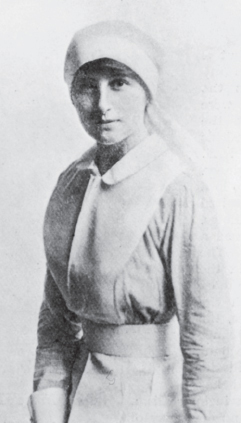Individuals in Society: Vera Brittain

Although the Great War upended millions of lives, it struck Europe’s young people with the greatest force. For Vera Brittain (1893–
Brittain grew up in a wealthy business family in northern England, bristling at small-
When war suddenly approached in July 1914, Brittain shared with millions of Europeans a thrilling surge of patriotic support for her government, a prowar enthusiasm she later played down in her published writings. She wrote in her diary that her “great fear” was that England would declare its neutrality and commit the “grossest treachery” toward France.* She seconded Roland’s decision to enlist, agreeing with her sweetheart’s glamorous view of war as “very ennobling and very beautiful.” Later, exchanging anxious letters in 1915 with Roland in France, Vera began to see the conflict in personal, human terms. She wondered if any victory or defeat could be worth Roland’s life.
Struggling to quell her doubts, Brittain redoubled her commitment to England’s cause and volunteered as an army nurse. For the next three years she served with distinction in military hospitals in London, Malta, and northern France, repeatedly torn between the vision of noble sacrifice and the reality of human tragedy. She lost her sexual inhibitions caring for mangled male bodies, and she longed to consummate her love with Roland. Awaiting his return on leave on Christmas Day in 1915, she was greeted instead with a telegram: Roland had been killed two days before.
Roland’s death was the first of the devastating blows that eventually overwhelmed Brittain’s idealistic patriotism. In 1917 first Geoffrey and then Victor died from gruesome wounds. In early 1918, as the last great German offensive covered the floors of her war-
Returning to Oxford and finishing her studies, Brittain gradually recovered. She formed a deep, restorative friendship with another talented woman writer, Winifred Holtby, published novels and articles, and became a leader in the feminist campaign for gender equality. She also married and had children. But her wartime memories were always there. Finally, Brittain succeeded in coming to grips with them in Testament of Youth, her powerful antiwar autobiography. The unflinching narrative spoke to the experiences of an entire generation and became a runaway bestseller. Above all, perhaps, Brittain captured the ambivalent, contradictory character of the war, in which millions of young people found excitement, courage, and common purpose but succeeded only in destroying their lives with their superhuman efforts and futile sacrifices. Becoming ever more committed to pacifism, Brittain opposed England’s entry into World War II.
QUESTIONS FOR ANALYSIS
- What were Brittain’s initial feelings toward the war? How and why did they change as the conflict continued?
- Why did Brittain volunteer as a nurse, as many women did? How might wartime nursing have influenced women of her generation?
- In portraying the ambivalent, contradictory character of World War I for Europe’s youth, was Brittain describing the contradictory character of all modern warfare? Explain your answer.

DOCUMENT PROJECT
What words and images did governments use to recruit women to serve in World War I? Examine several recruitment posters aimed at women, and then complete a quiz and writing assignment based on the evidence and details from this chapter. See Document Project for Chapter 28